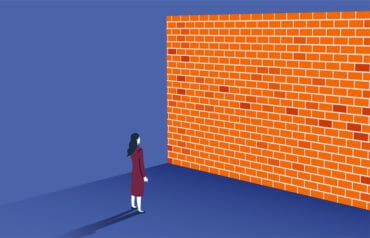Suicide is on the rise in the U.S., according to the Centers for Disease Control and Prevention. We should be talking about mental health all the time, but recent high-profile celebrity suicides have the social media universe abuzz on mental health issues.
Sadly, for many would-be lawyers, the conversation has included how state bars have given prospective attorneys great difficulty in the moral character process if they admit to seeking mental health treatment before their admission to the bar.
This needs to stop. Until it does, however, law students and other future lawyers need to get the help they need when they need it.
Bar Applicants: Get Help Now, Deal With the Bar Later
The need for help is paramount — dealing with the bar’s questions when it comes time for bar admission is secondary.
There is little doubt that the conversation surrounding mental health issues has evolved. The stigma is fading, albeit more slowly in some circles than others, and awareness is growing about the prevalence of depression, post-traumatic stress disorder and other mental health difficulties.
- In my world, I notice the ease with which people refer to their own past treatment. Recently, I met a woman who told me she had trouble standing close to a tennis net because she suffers from PTSD. The ball coming at her so close is tough. I had only just met her and yet she told me about this major personal issue.
- In races, I meet people like Doc Bee running for mental health awareness. As he says, obstacle course running is a metaphor for people suffering in silence and overcoming challenges with the help of individuals running with and beside them. Doc Bee even brings along large groups to race with him and put on a strong showing for the cause. Public advocates opening up the conversation make a tremendous difference.
- In veterans’ circles, far more open discussion of PTSD is making treatment more palatable to a lot of wounded warriors.
The legal field is recognizing the need to talk more openly, too. For example, the Florida Bar has taken a strong stance in support of lawyers’ mental health, forming a Special Committee on the Mental Health and Wellness of Florida Lawyers. One of its missions is to destigmatize mental health issues in the legal community.
Lawyer-Specific Resources
Treatment for mental health need not be attorney-specific, but it doesn’t hurt to share experiences and difficulties with others who know your particular stressors, whether as a law student or practicing lawyer. Many resources have been developed for lawyers, such as Jeena Cho’s book Anxious Lawyer, published by the ABA, and her podcast the Resilient Lawyer.
Most state bars publish lists of resources and most offer Lawyers Assistance Programs. (Here is the link to the ABA’s directory of state LAPs.) More programs are popping up that focus specifically on mental health, separate from substance abuse.
The Predicament Facing Law Students
Yet despite greater awareness and acceptance, individuals preparing for bar admission can face a terribly unfortunate predicament. They must weigh the need for treatment against the likely difficulty imposed by the bar if they disclose treatment in their moral character application.
Need for treatment. The need for treatment should outweigh all other considerations. Quite simply, if you need help, you should get it. The consequences of not getting help go far beyond your ability to get admitted to the bar. Failure to get help can lead to lifelong pain. Delay is not a better option. So if you need it, get it.
Importance of candor. When a state bar asks you in a moral character application if you have sought mental health treatment, there is a strong temptation to simply say no, despite the truth. After all, with HIPAA in place, the odds seem quite good that you can keep your treatment secret. But we are constantly reminded that candor is paramount in our profession. We should be honest and trustworthy and do the right thing even when (especially when) no one is looking. Applicants seeking to uphold these principles will report their treatment no matter the likelihood of being caught if they lie.
The state bar is not a trade association; it is a public protection agency. Its job is to protect the public, including from applicants who will not make lawyers capable of upholding the duties owed to clients. However, the supposition that applicants who once sought mental health treatment are incapable of adequately serving the public is highly concerning. Some points:
1. While “public protection” is routinely interpreted to mean “protect the public from the lawyers,” lawyers are members of the public, too. We are remiss as a profession if we openly sacrifice lawyers’ well-being in the name of “public protection.” Actively stifling future lawyers from seeking mental health treatment does just that.
2. Lawyers should be rewarded, not stigmatized, for seeking help. A lawyer who recognizes his limitations and accepts the need for help is a lawyer who should be encouraged. It is widely acknowledged that the very qualities that are rewarded in our profession are those that undercut lawyers’ mental health. We tend to be highly driven, type-A, strong willed, and often unwilling to accept help or admit weakness. These qualities are reinforced in our adversarial profession.
- How many discipline cases stem from lawyers who were overburdened with client demands, but were unwilling or unable to ask for help? Our profession would be better off, as would the public, if we shifted the incentives to begin rewarding the seeking of assistance when it is needed and not when a crisis occurs.
- How much better off would we be if we told state bar applicants that seeking help would not be a hindrance, but rather an indication that they are self-aware enough to seek help?
3. Encouraging stress management is a good thing. The legal profession is a tough place to be. It is high-stress and requires coping skills to navigate successfully. Getting effective mental health help means developing coping skills that will last throughout your career. So, the lawyer who seeks treatment early on is more likely to be one who is capable of managing the stress of the profession.
Get Help Before You Take The Bar
Law students with mental health problems may fear that treatment will reveal that they are working to enter the wrong profession. I say it is better to find out now than later.
The most important thing is to get the help you need when you need it — and deal with the consequences of getting healthy when the time comes and the dust clears. You will be stronger and more capable of handling the duties and responsibilities of your admission to the bar.
Illustration ©iStockPhoto.com
















